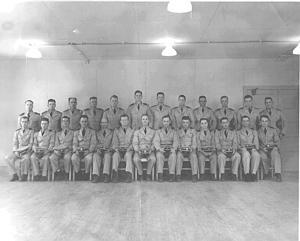
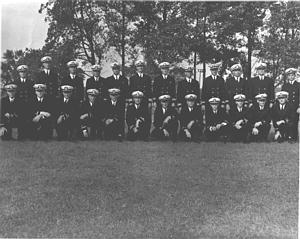
After a short but very rugged period of training here we prepared for a 5 day leave and the trip to the West coast for embarkation to foreign duty. The battalion consisted of some 1250 members, including 27 officers and about 80 Chief Petty Officers. It will be interesting to note that the 34th C.B. was the first "Colored" Battalion organized by the Navy. All enlisted personnel excepting 1st Class men were colored. The first class white personnel numbered some 200 men. All Chief Petty Officers and Officers were white.
Here we are in our work clothes after having returned from our 5 day leave.
Remained here about a week doing more training. Really swell living conditions
here for officers and men.
At Gulfport we entrained in three big sections (about 25 cars per section - all Pullman) for the long ride across country to the west coast. I was assigned to section 2, with our Executive Officer W. W. Davis in charge. We traveled Southern Pacific to New Orleans, then Santa Fe, across northern Texas Arizona and New Mexico to California. There were no diners on the train, as meals were supplied by Harvey Houses at designated stops from New Orleans west to central California.
The countryside was most desolate. Almost barren in fact, but interesting to us who were seeing it for the first time. The vast Texas prairies, the tumble weeds in action, the coyotes and etc. were all very much like the typical western fiction. The air was clear and dry, with occasionally a heavy dust storm. At one point it was cold across Texas and Arizona, temperatures below freezing. The officers on our section had an old combination Pullman and parlor car. Half Pullman seats and half with reclining chairs, and an observation platform. It was the last car on the train and was very comfortable, except at times when it was too cold, as the heating system was out most of the time.
The scenery for the most part was very monotonous, just endless dry and barren prairie. As we approached California the countryside became very rugged with high barren mountains. Only after getting into California did any signs of vegetation come into view. Here the irrigated sections started, with the orange and lemon groves literally loaded down with their golden fruit. It was quite a relief to see some green again after the days of desert country.
Our section pulled into Los Angeles in the early evening, just in time to get our evening meal at the Harvey House there. They had been advised about the time of our arrival, and we really took over. We just filled the place up to overflowing, and were all served a full dinner from soup to nuts. After an hour or so of rest, back to the train, and on our way again to our destination Port Hueneme (pronounced Y-nee-mee. Why? I don't know.). We arrived at our destination quite some time after dark, and were met by cars and trucks, which quickly whisked us, and our belongings to our allotted section of the base.
The trip was not without it's worries and little simple but amusing incidents. The whole trip was made under the utmost secrecy, and yet at one little God-for-saken place away out in the prairies of Texas, while we were stopped for a train inspection an attendant came in to get one of our officers who lived in Texas. And Lo, and behold, these alongside of the tracks was a couple of Uncles and Aunts and a half dozen cousins from a town some hundred miles or so away. And then again, absolutely no mail was allowed to be written or mailed en route. This caused us a lot of worry and kept us officers on the alert.
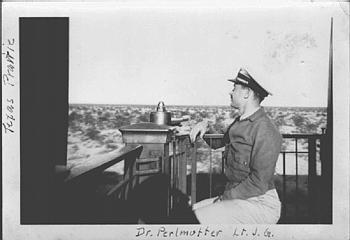 At one station, just as the train was pulling out,
some officers on the rear platform noticed a lot of letters
lying in the tracks. The Executive Officer immediately had the
train stopped, just as a station porter started picking up the
letters. We gathered in all the letters as the FBI took in the
attendant, who had arranged with our boys to pick up their mail
after the train pulled out. We were busy then opening letters
and getting names, and some 60 men went on report.
At one station, just as the train was pulling out,
some officers on the rear platform noticed a lot of letters
lying in the tracks. The Executive Officer immediately had the
train stopped, just as a station porter started picking up the
letters. We gathered in all the letters as the FBI took in the
attendant, who had arranged with our boys to pick up their mail
after the train pulled out. We were busy then opening letters
and getting names, and some 60 men went on report.
(Pictures snapped by our Photographic Officer, Mr. Myers.)
Port Hueneme! What a surprise for us the next morning as we got the first view of our surroundings. Still under construction, and though our Quonset Huts were complete, though sparsely furnished, the streets in our section were still under construction. In fact all around us were hundreds of men and machines working from dawn to dark. And when it rained, as it did frequently in the early days of our stay there, the mud was terrific, and no getting around it. Then out would come the Sun, and it would dry out quickly. If the sun shone for a few days at a stretch, the dust would choke you. In fact the winds would raise dust storms that would blot out the sun for hours, and sift into every crack and cranny. Dust would be everywhere; in your clothes, in your eyes, ears, and nose, under the clothes on your back, in the food; yes everywhere.
Then as we moved around the base, one was actually astounded at it's size and scope. Port Hueneme! The C.B. Depot for all materials and equipment to be shipped to the Pacific theater of the war. An enormous place, literally loaded down with materials. Even docks and loading facilities, and stretched around them as far as the eye could see, equipment and supplies and materials of all kinds and description. Acres and acres of trucks, jeeps, lumber, pipe, electrical equipment refrigerators, pontoons for barges and etc. Yes, anything that man was manufacturing was somewhere in that vast area.
The docks were capable of loading three ships at one time, and great construction projects were under way enlarging these facilities. And I was to live to see the day that this base was to double in size, and be capable of loading 12 ships at one time. All this brought forcibly to our minds for the first time, the rush and bustle, and the feverish preparations for war. And the more we worked around and in all that feverish activity, the more ominous that word WAR became. Then one day while on the docks, I passed a group of some twenty Chief petty Officers who had just been landed from small boats. They were ragged and dirty and seemed to have no gear. Then came the chilling Truth. They were survivors of a C.B. Unit whose ship had been torpedoed some 600 miles off shore. Yes, the war seemed to be coming closer and closer to us.
SOUTHERN CALIFORNIA
But all was not work and worry during those days. We were all allowed a generous amount of Liberty, and the base was close by the center of California's greatest offering, Hollywood. One week-end I be took myself off to see the much advertised Hollywood. I really do not know what I expected, when I landed at Hollywood and Vine I was greatly disappointed. It was no different from the main corner of any American Town. Drab and, dirty and congested.
But in back of all this commonplace exterior, one could find the Glamour of Hollywood. The main street was lined with odd little stores and curio shops, where one could buy most anything from a tooth pick to a telephone pole, just so it had a signature of some kind on it. The theater lobbies were unusual and different, and the footprints on the Lobby floor of Grauman's Chinese were all as advertised. The studios were closed to visitors at this time, due to War precautions, but one could roam around town at will, and this has always been a pleasant diversion to me. Everywhere were crowds, civilians, soldiers, sailors and Marines. Transportation was taxed to the breaking point, but no one seemed to care. All seemed to be having a good time. Cocktail Lounges were plentiful and some were extremely elaborate. The Bamboo Lounge of the Brown Derby was one of the most unique.
I walked up into the hills surrounding the town, and roamed around among the gorgeous homes of the many movie stars. The quaint houses seemed precariously perched on the edge of the steep hillsides, and at times one wondered what kept them in place. Some of the views from the top of the hill were grand. Hollywood lay spread out at your feet, seemingly an orderly and colorful little town. Yes, Hollywood seemed quite a place after all.
Then the fight for transportation, to get back to the base. But who cared for that, for those weekend trips were so very delightful. Also visited Los Angeles and some other little towns in the vicinity of the base, such as Oxnard and Ventura. All beautiful little towns, gorgeous in their colorful array of flowers. Poinsettias were plentiful in these parts and the plants grow to be regular trees. The big red blossoms sometimes being higher than the roof tops of the little houses. Begonias grow into hedges here, Lantana grows into regular carpets of color. Really beautiful settings.
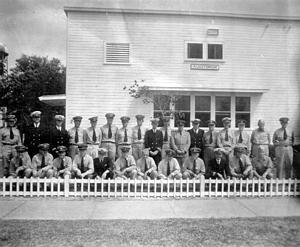
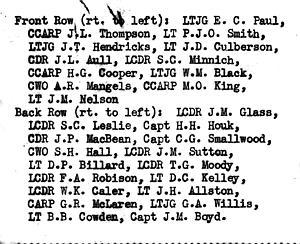 Ed: Unidentified photo, Camp Hueneme perhaps? |
But finally the day came when Liberties were practically cut off, and we received word that our equipment was being placed on the dock ready for loading, and that two ships were due in to pick up the 34th Battalion. Then we realized that out time was growing short. We began a two weeks period of long hard work, checking, marking and stowing equipment. I was assigned to go on the freighter as Cargo officer. I spent many days watching the loading and checking on this ship so as to become familiar with the locations of the many items of equipment stowed aboard. Two ships were assigned to take out our Battalion. One, the troop ship Island Mail, a 12,000 ton combination freighter and passenger ship which had been converted into a troop carrier. It carried the men and housekeeping equipment, and a small amount of freight. This ship already had some 300 men and Officers aboard, who were the headquarters and communication personnel of the Acorn 4 Group, that we were attached to as the construction unit.
The other ship, the Alcoa Pennant was an 8000 ton C Type combination freight and passenger ship built for the Alcoa lines for the Oriental Service. Two other officers were assigned to this ship besides myself, also some dozen or so men, to be used to fill in on Gun Crews, of the Armed Guard. The quarters aboard were unusually nice, though crowded. I drew the main stateroom with two beds and a bath. A chief petty officer and a first class man shared the room with me. We stowed our gear and made ourselves at home for we realized that this would actually be home for us for quite some time to come. I spent most of my time in the days that followed aboard ship watching the loading and it was really uncanny the enormous amount of materials that actually was put aboard. After the five holds were completely filled, the decks were loaded solid. Cat walks had to be built over the deck materials, so that the gunners and crew could have access to their positions. No sooner were the catwalks completed than word came that the Battalion was to board ship. Early next morning the men were at the docks with bag and baggage, and checking aboard began. As Cargo Officer of the freighter, I went aboard the troop ship and received my final instructions and orders from our Commanding Officer. Then back to the Alcoa Pennant, and completed checking of men assigned to me, and seeing that they were all comfortable. Then the gang-plank was hoisted aboard and we all gathered on deck as the ship slowly got under way. It was a strange feeling, deep down inside of you that made you force a laugh, and maybe shout to someone on the dock as we drew away.
At 1600 on the 7th January, amid shouts and cheers from the workmen on the dock, we moved out of the harbor. Yes Finis was written to a chapter in our lives. A new page was turned and we faced into a future of doubt and uncertainty. What lay ahead? Would we ever live to return? But the future is ever in the hands of the Creator, and it is well that it is so. Whatever lay ahead, we would meet it as it came. So good bye to home and country and those we love, we leave you in God's care. Come future and War we meet thee with Faith and Confidence, and pledge you our all.